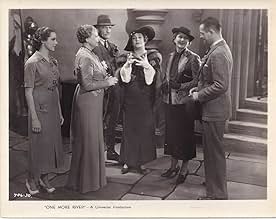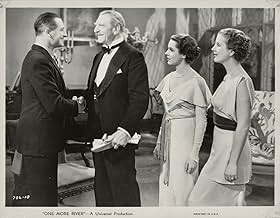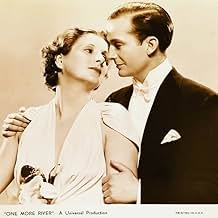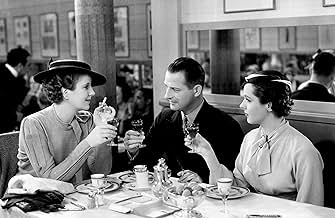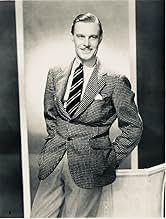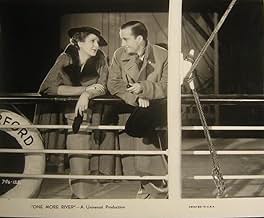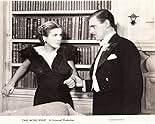Aggiungi una trama nella tua linguaA young lady leaves her brutal husband and meets another man aboard a ship.A young lady leaves her brutal husband and meets another man aboard a ship.A young lady leaves her brutal husband and meets another man aboard a ship.
- Regia
- Sceneggiatura
- Star
Recensioni in evidenza
A woman finds herself sued for divorce by the brutish husband who beat her with a riding whip. The kind of situation that would be unthinkable today but which was probably considered to be quite saucy back in the 1930s, despite the terribly proper tone of R. C. Sheriff's screenplay. When Dana Wynyard and Frank Lawton both gaze beyond the camera, and he says, ever so matter-of-factly, "You realise, of course, that I love you," it's impossible not to laugh. It's a pleasant enough watch, but it's tone is inconsistent and often inappropriately humorous
Saw this as part of Cinefest 2009 in Syracuse, and it was a revelation. Not that it doesn't stir high expectations: a Galsworthy novel, adapted by playwright R.C. Sheriff (author of the great antiwar play "Journey's End"), directed with great assurance by James Whale, and with a near-amazing cast. As an abused high society wife trying to wrench free of her extremely nasty husband, Diana Wynyard is ladylike and touching. A very young Jane Wyatt is her confidante, Henry Stephenson is a helpful lawyer relative, and Frank Lawton is the appealing young man who falls in love with her. All are upstaged by Mrs. Patrick Campbell, a formidable presence bellowing every line with relish, and she It's remarkably adult for its day, with a modern attitude about adultery (our heroine doesn't, but the movie seems to believe she should). It's literate and fast-moving, and sandwiched between Whale's "The Invisible Man" and "The Bride of Frankenstein," it's one of several examples of how assured he was outside of the horror genre.
Today, 1930s director James Whale is best remembered for "Frankenstein", "The Invisible Man", and "The Bride of Frankenstein", as well as for being probably the only openly gay person in cinema at the time (Ian McKellen played him in 1998's "Gods and Monsters"). Lesser known are Whale's dramas. There was "Waterloo Bridge", about a relationship strained by World War I, and "One More River", about a woman who flees an abusive marriage and hooks up with someone else. Not something usually depicted back then, so I wonder if it would've even been possible once the Hays Code went into effect the following year.
It's not a masterpiece, but passable. I find these fetishistic looks at the British ruling class weird (especially considering Whale's dirt-poor childhood). I suppose that nowadays, such a movie - whether focusing on the working class or ruling class - would probably come from Pedro Almodovar. Diana Wynyard, Jane Wyatt, Colin Clive (Dr. Frankenstein in Whale's more famous movies) and Frank Lawton all turn in fine performances.
It's not a masterpiece, but passable. I find these fetishistic looks at the British ruling class weird (especially considering Whale's dirt-poor childhood). I suppose that nowadays, such a movie - whether focusing on the working class or ruling class - would probably come from Pedro Almodovar. Diana Wynyard, Jane Wyatt, Colin Clive (Dr. Frankenstein in Whale's more famous movies) and Frank Lawton all turn in fine performances.
I enjoyed this film, but must be nearly alone in not particularly finding Diana Wynyard appealing in any real way, in her role as the unhappy, abused wife. Jane Wyatt on the other hand, as her sister, is sophisticated and lovely, very Myrna Loy.
Having read lots of books set in Edwardian England, I am familiar with the often ludicrous plots involved in setting up divorces and cases of criminal conversation. If you accept that the laws were limited and often ridiculous, you can overlook what seems so old-fashioned.
It is amusing to see Mrs. Patrick Campbell in action; she is a grand ham. The part of the abusive husband is a stereotype; he is oily and creepy and cruel. The new love is the opposite of course, charming and kind and gentle.
Overall a well-made film; just wish it had been made a year earlier before the draconian production code took over.
Having read lots of books set in Edwardian England, I am familiar with the often ludicrous plots involved in setting up divorces and cases of criminal conversation. If you accept that the laws were limited and often ridiculous, you can overlook what seems so old-fashioned.
It is amusing to see Mrs. Patrick Campbell in action; she is a grand ham. The part of the abusive husband is a stereotype; he is oily and creepy and cruel. The new love is the opposite of course, charming and kind and gentle.
Overall a well-made film; just wish it had been made a year earlier before the draconian production code took over.
This is a superior film, but its impact is attenuated by the great changes in social attitudes toward sex and divorce which have occurred since the time it was filmed. The conflicts and tensions in the story could only occur today in third world nations or very religious communities. Thus, most American viewers can wonder what all the excitement is about.
Diana Wynyard is a revelation. When the film began, she appeared a bit on the plain side. However, she became enchantingly beautiful as the movie progressed. Her soft, pleasant, kind features and the exquisite shape of her head and body impressed me more and more, as did her calm manner and then her assertive testimony in court.She became irresistible.
Universal gave this a veneer of a prestige production. It looked like it was shot in England, except that most of the English performers were already old Hollywood hands. Jane Wyatt wisely didn't try for an English accent. Whales' direction was seamless, but not as flashy as his more famous horror productions. He kept things moving briskly.
Diana Wynyard is a revelation. When the film began, she appeared a bit on the plain side. However, she became enchantingly beautiful as the movie progressed. Her soft, pleasant, kind features and the exquisite shape of her head and body impressed me more and more, as did her calm manner and then her assertive testimony in court.She became irresistible.
Universal gave this a veneer of a prestige production. It looked like it was shot in England, except that most of the English performers were already old Hollywood hands. Jane Wyatt wisely didn't try for an English accent. Whales' direction was seamless, but not as flashy as his more famous horror productions. He kept things moving briskly.
Lo sapevi?
- QuizAccording to Jane Wyatt, "[James Whale] was crazy about Mrs. Pat [Mrs. Patrick Campbell]. The set was kind of run for her. The whole thing was to get her relaxed. She was playing up a lot about how nervous she was, and I think she got an awful lot of attention that way. i think we felt sorry for Mrs. Campbell. Poor dear--how ever are they going to pull her together. That was my reaction. We all had to pull her together and help her through.
- BlooperIn the opening scene, the liner pulling into the London dock that lady Corven arrives on is seen in the establishing shot is clearly named the ORFORD, yet after a we see her and Tony speak on the deck, another establishing shot of the ship now shows it is one called the ORSOVA.
- ConnessioniReferenced in Demoni e dei (1998)
I più visti
Accedi per valutare e creare un elenco di titoli salvati per ottenere consigli personalizzati
Dettagli
- Data di uscita
- Paese di origine
- Lingua
- Celebre anche come
- Över floden
- Luoghi delle riprese
- Azienda produttrice
- Vedi altri crediti dell’azienda su IMDbPro
- Tempo di esecuzione1 ora 28 minuti
- Colore
- Proporzioni
- 1.37 : 1
Contribuisci a questa pagina
Suggerisci una modifica o aggiungi i contenuti mancanti

Divario superiore
By what name was One More River (1934) officially released in Canada in English?
Rispondi
